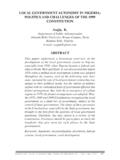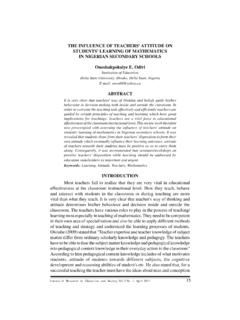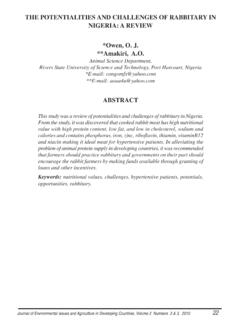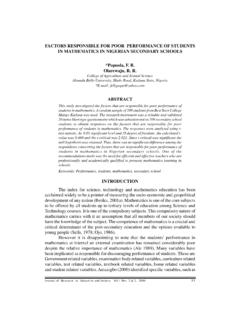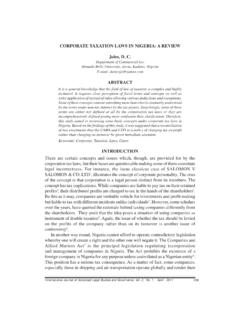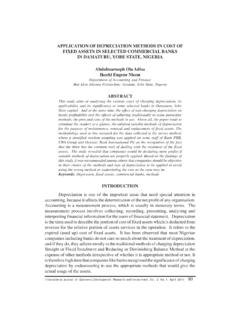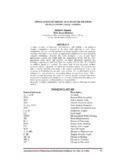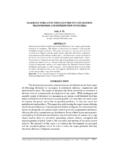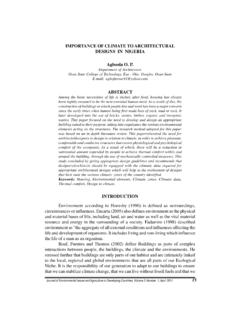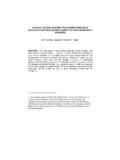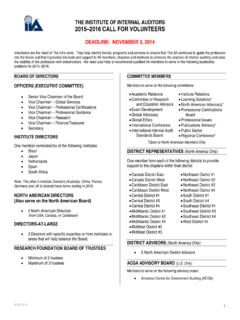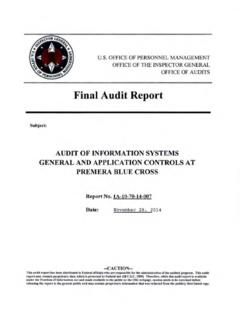Transcription of Impact of Effective Internal Audit Functions on …
1 International Journal of Economic Development Research and Investment, Volume 4, Number 3, December 201391 ISSN: 2141 - 6729 Impact of Effective Internal Audit Functions on Public SectorManagement and Accountability in Edo State, NigeriaOnatuyeh, E. A.*Aniefor, S. of AccountancySchool of Business StudiesDelta State Polytechnic, Ozoro, NigeriaE-mail: survey examines the Impact of Internal Audit Functions on public sectormanagement and accountability in Edo State of Nigeria. Its main objective is toascertain the extent to which Effective Internal Audit Functions could be used asan instrument to improve public sector management and accountability in EdoState. Data were collected via a well structured and tested questionnaireadministered on 245 respondents in the Audit departments of 12 governmentministries and parastatals in Benin City, Edo State.
2 The data collected wereanalyzed using Cross tabulations, descriptive statistics and Spearman rank ordercorrelation coefficient. The findings of the study suggest that Effective internalauditing ensures proper stewardship reporting, and inadequate qualifiedmanpower does hinder proper auditing of government accounts in Edo on these, it is concluded that auditing of government accounts isfundamental to the Effective and efficient stewardship reporting by accountingofficials without political and administrative interference. Hence, it isrecommended among others that objectivity, integrity and transparency shouldbe observed by auditors and council officials and improvement of internalauditors remuneration and fringe benefits should be improved for : Internal Audit Function, Accountability, Public sector, Edo is an independent examination of, and the expression of an opinion on the financialstatements of an enterprise by an appointed auditor, in accordance with his terms ofengagement and the observance of statutory regulations and professional requirements(Mainoma, 2007; Dandago, 1999).
3 It is a systematic investigation and appraisal oftransactions procedures, operations and result in financial statements (Anichebe, 2010).The auditor should be approved and must have personal and operational independence inorder to perform his duty effectively. Akpata (2001) and (Sabari, 2003) classify Audit intofour: private, statutory, management and Internal Audit , even though all the types of auditfocus on regulations, which lead to control of expenditure or revenue. Millichamp (2000)defines Internal auditing as an independent appraisal function within an organisation forthe review of system of control and the quality of performance as a service to theorganisation. Unegbu and Obi (2012) see Internal Audit as part of the Internal controlsystem put in place by management of an Organization to ensure adherence to stipulatedInternational Journal of Economic Development Research and Investment, Volume 4, Number 3, December 201392 ISSN: 2141 - 6729work procedure and as aid to management for smooth administration, control costminimization; ensure capacity utilization and maximum benefit derivation.
4 Adeniji (2011)and Tijjana (2003) encapsulate Internal auditing as a review of various operations of thecompany and of its records by the staff specially appointed for this purpose. By measuringand evaluating the effectiveness of organizational controls, Internal auditing, itself, is animportant managerial structure and the general rules of the business (Cai, 1997; Schniderand Winers, 1990). Internal auditors are concerned with the entire range of an organization sinternal controls that includes operational, financial, and compliance controls (Simmons,1997). Contemporary Internal controls and well-functioning Internal Audit systems aremeant to deliver key assurances to all stakeholders against corruption, waste, andinefficiencies in public services. In the absence of a control system with Internal Audit as asafeguard for checking efficiency and effectiveness of that system, government offices arevulnerable to waste, corruption, and goal of Internal Audit function should be to add value and improve anorganization s operations and control structure.
5 Effective and efficient Audit of accountsensures the proper reporting of the activities of an organization (Okezie, 2008; Nwaorgu,2003). Internal auditing ensures that funds have been expended in accordance with theterms by which such monies were appropriated and that accounts have been properlyprepared (Johnson, 2004). It provides both governments and related parties with a powerfultool for understanding the extent to which the public institution has delivered on-budgetand Effective services. Therefore, Internal Audit is a well-defined activity and a recognizedprofession (Manasseh, 2007; IIA, 1994) that is performed by professionals who determinewhether the organization s decision making is sound and Effective . The elements of effectiveinternal Audit comprises; auditor independence, good working relationship, proper staffingand training, exercising due care, evaluation of Internal control systems, proper reportingand follow-ups, among others (IIA, 2004).
6 Scope and Objective of Internal Audit FunctionThe scope and objective depend upon the responsibilities assigned to the Internal auditorby the management, the size and structure of the enterprise and the skills and experience ofthe Internal auditor. Sani (2009), Mainoma (2007), Vos (1997) and others all highlight thecommon areas covered by Internal auditing to include among others; reviewing the internalcontrol system with a view to determining its adequacy and effectiveness, reviewingcompliance with government regulations and accounting rules and standards, checkingcompliance with policies and procedures, safeguarding the asset of the organisation so asto prevent and detect errors (Stoner, 1994), frauds and theft, appraising the effectivenessand efficiency in the use of resources, ensuring that the goals and objectives of the organisationare attained, making recommendations on improvement in the operation of the organisation,acting as in-house consultant on control matters (Millichamp, 2000).
7 Owler and Brown(1999) declare that the objective of Internal auditor is to protect management againsterrors of principle and neglect of duty. Barker (1999) agrees with Owler and Brown butadds that it is to review the operations and record of the undertaking and in the course ofthese checks to ensure that much of the detailed work of the organization in respect ofInternational Journal of Economic Development Research and Investment, Volume 4, Number 3, December 201393 ISSN: 2141 - 6729financial and other statements are effectively audited. Tracey (1994) is of the view that it isthe responsibility of the Internal auditor to review how well the accounting system worksand also evaluate the effectiveness and efficiency of many operations in the organization. Alot of public sector has been operating without Internal auditor. This can be attributed tothe fact that few people outside the accounting profession realize the importance of theinternal auditor (Tijjani, 2003).
8 Emphasis was laid on discharging accountability for the useof owners fund through the Internal auditor s report. Some public sector managementadduces the argument that Internal auditors, being employees in public sector do not havethe liberty to exercise the unbiased and independent attitude so necessary to an auditor(Rafiu and Oyedokun, 2007).Public Accountability and Audit AccountabilityThere is no generally accepted definition of the term accountability. Adesola (2001) maintainsthat accountability is one of those terms employed in government studies, which suffersfrom frequent misuse and imprecise or varying meaning. Adesola (2001), however, goeson to define it as the duty imposed on any person who holds power or authority or is inposition of trust to act for and on behalf of another person to take responsibility for hisaction and to render account of stewardship whenever it is necessary to do so.
9 Dowdall(2003) also considers accountability not to be a simple notion which is often not wellunderstood and its Effective application to the complexities of government today can bequite daunting. Johnson (1994) argues that the definitional problem may be due in part tothe fact that the traditional way of thinking about accountability in public administrationrepresents an insufficient framework for analysis. Day and Klein (1997) view accountabilityas being directed at the community at large, rather than at the lines of constitutionalaccountability. In similar vein, Dowdall (2003) concedes that modern governance andmanagement reflect contemporary pressures from various sources in society. Thesepressures involve:iThe emergence of essentially non-hierarchical relationships in many alternativedelivery approaches being tried today, such as network, partnerships andarrangements between the Federal and State governments, where responsibilitiesmay not be conferred from a senior party to a junior one but agreement nonethelessassume accounting for results;iiThe call for an increased focus on results and performance-based management bythe public sector in addition to addressing concerns with the integrity of governance;iiiThe parallel call for providing greater flexibility and autonomy to governmentorganizations and managers in order to achieve better results; andivThe importance of transparency as an essential feature of public pressures determine which perspective of accountability is adopted.
10 Consequently,accountability can be viewed from a number of perspectives (Rafiu and Oyedokun, 2007),including the traditional perspective, democratic perspective, regulatory perspective aswell as government Journal of Economic Development Research and Investment, Volume 4, Number 3, December 201394 ISSN: 2141 - 6729 Internal Audit in Government OfficesThe nature and position of the Internal Audit department in government differs from onecountry to another (Mizrahi and Ness-Weisman, 2007). The law requires that an internalaudit department or unit be established in each government office in Nigeria, and shall beheaded by an experienced or/and a qualified accountant in order to provide a completeand continuous Audit of the accounts, and records of all received and expenses (Aruwa,2003). Additionally, Internal auditors of every office should be accountable to the accountingofficer and Auditor General of the state on the real situation in terms of conformity with thestandards of the Audit work and also the Internal auditor shall issue special reports, wherenecessary, if he is of the views that the Auditor General (State) concerned is needed(Barkan, Gboyega and Stevens, 2001).
